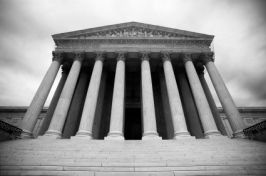
The Supreme Court of the United States (SCOTUS) hath taken away, but could it giveth soon?
Last week SCOTUS shut down pathways to relief for thousands of noncitizens in the criminal context, but next month the Court will hear two cases that could potentially swing the door open to noncitizens in same-sex relationships. Last week in Chaidez v. United States, SCOTUS held that its 2010 ruling in Padilla v. Kentucky could not be applied retroactively. Based on Padilla, lawyers are required to advise noncitizen clients of immigration consequences of pleading guilty to certain crimes. However, with Chaidez, SCOTUS declined to apply Padilla retroactively, issuing a devastating blow to thousands of immigrants with pre-Padilla convictions who could have used the Padilla ruling to withdraw guilty pleas for ineffective assistance.
Next month, SCOTUS will hear oral arguments on two gay rights cases that could have a significant impact on immigration. On March 26, SCOTUS will hear arguments on California's Proposition 8 in Hollingsworth v. Perry, and the next day, the Court will hear the government's challenge to the Defense of Marriage Act (DOMA) in United States v. Windsor. Same-sex litigation has had a rippling effect in the immigration court system from the top down. In addition to the SCOTUS cases, in Matter of Dorman, the Attorney General vacated a Board of Immigration Appeals order that denied to find a noncitizen eligible for cancellation of removal in removal (deportation) proceedings. Cancellation of removal requires that an applicant have a qualifying relative (a U.S. citizen or permanent resident spouse, parent, or child). However, the noncitizen in Dorman was in a longterm partnership and civil union with a U.S. citizen. The Attorney General remanded the case to the Board to address DOMA’s constitutionality and reconsider Dorman’s eligibility for cancellation of removal. Based on Dorman, it was not uncommon for the Board in 2012 to remand appeals on family visa petitions involving same-sex couples. The Board has yet to issue a decision in Dorman though,and popular belief is that it is waiting for SCOTUS to rule on constitutionality issues in the DOMA and Prop 8 cases.
It is clear that all eyes are on SCOTUS as it prepares to hear arguments on DOMA and Prop 8. Once those decisions are issued, we can only expect a domino effect in gay rights issues and beyond. Immigration will undoubtedly be among the biggest areas impacted. There is the potential for same-sex couples (in partnerships, civil unions, marriages) to receive the same standing and immigration benefits as married men and women now enjoy. Regardless of the holdings, however, it is certain that one side of the divide will cry out in joy, and from the other, there will only be outcry. I have a feeling that more litigation will result. Stay tuned.
